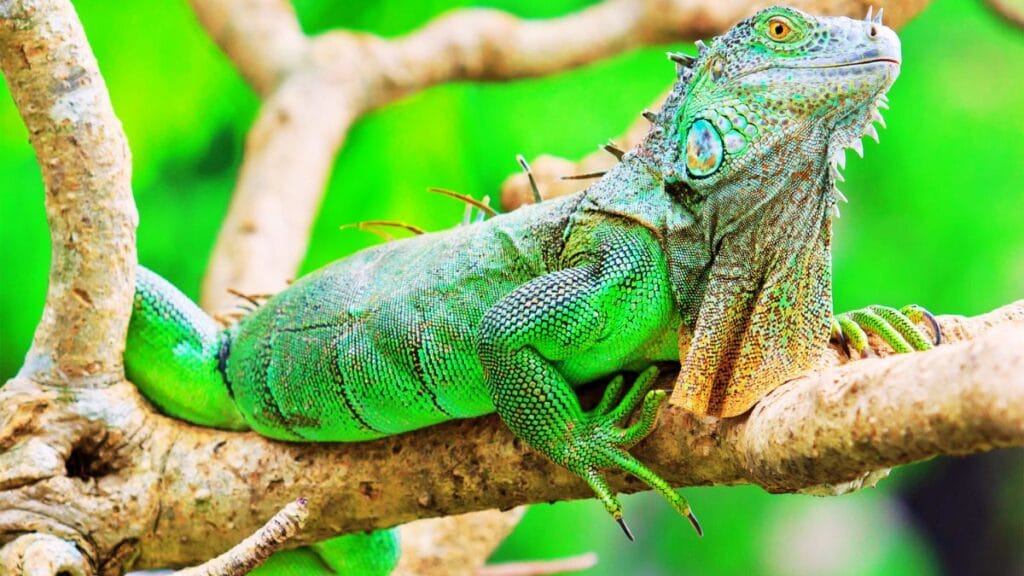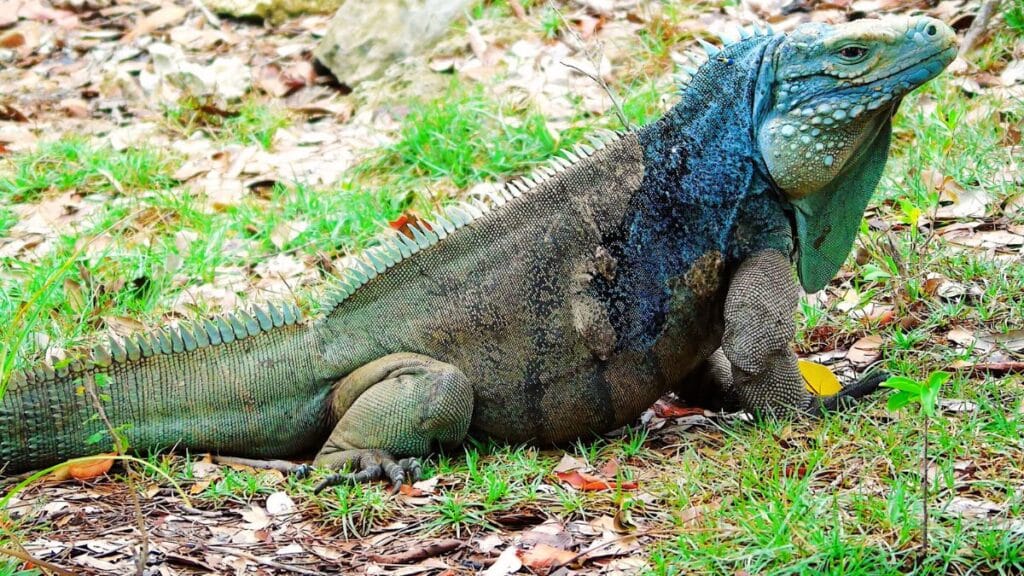Iguanas are herbivorous lizards endemic to North and Central America, specifically Mexico, the Caribbean Islands, the USA, and part of South America.

Green iguanas are very popular as pets worldwide and spread throughout and beyond their range. Even these species have been introduced in countries such as Singapore, Thailand, and Taiwan.
But many reptile lovers have a common question: Are iguanas suitable pets for families, especially for first-time owners? Let’s find out:
9 Facts About Iguanas You Must Know Before Keeping Them As Pets:
Iguanas Are Large Lizards:
Iguanas are among the largest lizards in the world, ranging from 1.2 to 2.0 m (4 to 6.5 ft) in length, including their tails.
They have different types of scales throughout their bodies, which may be different colors and not be visible from close distances.
Iguanas Are Very Difficult To Trace:
Iguanas are excellent at camouflage as they are very difficult to spot, even from close distances.
They can perfectly blend themselves with their surroundings and help them escape from predators.
Their Eyes are Sensitive To Ultraviolet Lights:
Iguanas have a pale scale towards the back of their heads marking the parietal eye and are sensitive to ultraviolet light.
This organ is susceptible to changes in illumination and signals between day and night. This is due to a photopigment called parapinopsin, also present in lamprey.
Iguanas Are Herbivoros:
Iguanas are primarily adapted to a herbivorous lifestyle and foraging on vegetation and foliage. They feed on leaves, flowers, fruits, and seeds of various plants.
It is worth mentioning that the bite force is much higher than other carnivorous and omnivorous reptiles. Their skulls have undergone massive modification, resulting in stronger bite force.
Iguanas Are Part Of Culinary Traditions:
Iguanas are historically a part of traditional Mexican and Central American cuisines. Iguana meat and eggs are also consumed in the USA, the Dominican Republic, Puerto Rico, parts of Latin America, and Colombia.
Iguanas Are Long-Time Commitments:
Iguanas are generally wild animals and usually live 8-10 years in the wild. However, in captivity, they can live up to 15-20 years with proper care and commitment.

Iguanas May Not Be Suitable Pets For First-Time Owners:
Despite their friendly nature and dragon-like appearances in their youth, Iguanas are not easy to take care of. These lizards can grow up to 1.5 m long and weigh up to 15 lbs.
Keeping an Iguana lizard can be extremely challenging if you are not a professional and experienced reptile keeper, as Iguanas require much more care and attention than dogs or cats.
In many countries and states, Iguanas are considered as an invasive species, and it becomes more difficult to get a license for your Iguana. Hence, before you want to purchase a pet Iguana lizard, check your local laws about the species.
Iguanas may have complex personalities depending on the season, captivity, health conditions, and hormonal fluctuations. Many Iguanas can show friendly attributes during their youth, but with age, they can be aggressive and change their personalities drastically.
Iguanas are generally solitary animals. They cannot get along with other Iguanas or similar species. If you try to keep more than one Iguana at a place, they might cause trouble and kill each other.
Pet Iguanas Need Lots Of Space:
Iguanas are one of the largest lizards in the world, and the experts recommend having a cage of at least twice their length. According to many owners, the perfect size of the cage is 12 feet long, 6 feet wide, and 8 feet tall.
However, many owners decide to convert an entire room into a cage for an Iguana. As these lizards are tree-dwelling species, wooden substrate and bedding can be ideal for Iguanas.
Being tropical species, Iguanas need 70-80% humidity alongside 85 degree Fahrenheit temperature. You must closely monitor the temperature so that it doesn’t fall below 75 degrees Fahrenheit and doesn’t exceed 95 degrees Fahrenheit.
You also need UVB bulbs designed for reptiles to provide the lizards enough light for 10-12 hours a day and promote vitamin D production. Hence, keeping an Iguana can be costly, and you must be financially prepared for it.
Iguanas Can Be Dangerous For You:
Iguanas can be very harmful to human beings, especially to children and old people. You may get salmonella from touching or being near Iguanas. You may also experience symptoms like asthma attacks, eye irritation, and rashes.
Generally, Iguanas are not aggressive, but once they are threatened, they might get aggressive and attack human beings and other animals. Their bite force is very high, and they can injure any human being, especially children and old people.
However, Iguanas are also prone to many diseases, especially if you commit care-related mistakes. Thermal burns, dehydration, and parasites are some of the common health-related issues that these lizards face. Most of the Iguanas die due to kidney issues and improper husbandry issues.
Hence, keeping an Iguana as a pet is not a good idea for a first-time owner, especially one who doesn’t have enough knowledge about reptiles.
It is advised to check your Iguana before buying if it is wild-caught or cultivated. Iguanas are not expensive, and you may find them at a cost of $20-$50 in the USA.
Also Read: 7 Interesting Facts About Slow Lorises You Must Know
Also Read: 4 Pros And Cons To Consider Before Having Bearded Dragons As Pets
Also Read: Are Cape Rain Frogs Good Pets? 8 Fascinating Facts
Also Read: 9 Lesser-Known Facts About Zebra-Tailed Lizards Might Shock You